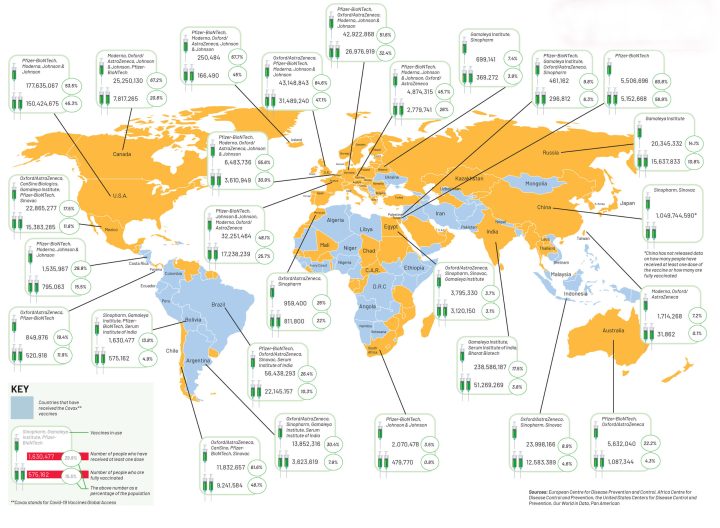DM168 CORONAVIRUS
Okay, you’re vaccinated: What now?

Two million people can breathe a sigh of relief ... kind of. There are variants, and different vaccines have varying effectiveness. For now, anti-Covid measures have to be maintained until more people have had their jabs.
First published in the Daily Maverick 168 weekly newspaper.
Six weeks into the roll-out, 0.8% of our population is fully vaccinated with another 3.5% partially vaccinated against Covid-19. These 2.3 million people can breathe a sigh of relief for their own health, but their behaviour still affects the rest of the population.
Put another way, 2,070,478 people have received the first of the double-dose Pfizer Covid-19 vaccine. They are fully vaccinated two weeks after they get the second dose, which comes 42 days after the first. These are some of the most vulnerable people in the country, being over 60 years old or healthcare workers.
Only 479,770 people have been fully vaccinated. They have received the single-dose Johnson & Johnson vaccine during the Sisonke programme.
It remains law for South Africans to wear a mask when in public and businesses must enforce physical distancing and good hand hygiene. Those who are vaccinated have good reason to keep following these protocols, for the sake of their and others’ health.
The National Institute for Communicable Diseases (NICD) has urged those who are vaccinated to be cautious – they are still at risk of contracting Covid-19. The disease will be milder in comparison to those who are unvaccinated, decreasing the risk of severe illness, hospitalisation and death.
These two vaccines have proved to be safe and effective, but do not offer complete protection. Clinical trials show that the Pfizer vaccine is 92% effective against severe Covid-19, whereas the Johnson & Johnson jab is 85.4% effective. Common side effects are headache, fatigue, muscle and joint pain, fever, chills and pain at the injection site, and they typically last for a day or two.
In terms of more adverse side effects, they remain very rare and the potential benefits of the vaccines outweigh their known and potential risks, according to the World Health Organization. A severe allergic reaction, called anaphylaxis, remains very rare – 10 cases per million vaccinated, in the case of the Pfizer vaccine. So does a very rare and unusual clotting syndrome called thrombosis with thrombocytopenia – two to three cases per million vaccinated, in the case of the Johnson & Johnson vaccine.
In South Africa, the Johnson & Johnson vaccine has proven to be extremely safe. In an article in the New England Journal of Medicine, a group of 12 researchers reported that “the rate of adverse events with vaccination is low” and thromboembolic events occurred mainly in persons who were at risk for this. No cases of thrombosis with thrombocytopenia were reported.
In an advisory, the NICD explained that it takes 14 days for the body to develop a strong immune response after the single dose of the Johnson & Johnson vaccine.
In the case of the Pfizer vaccine, there is some protection two weeks after the first dose. The best protection comes two weeks after the second dose. Breakthrough infections occur in one in 100 people after the Pfizer dose, but only in one in 1,000 people after the second dose.
It is not yet known if vaccinated people can transmit the virus to others. The NICD advised that they quarantine for 10 days after exposure to someone who is infected.
“Although the evidence suggests that people who are vaccinated are less likely to get infection after exposure, at this time … there are too few people who are vaccinated for a change in quarantine guidelines,” it said.
“The USA Centers for Disease Control and Prevention has recommended that neither quarantine nor adherence to mask wearing or social distancing is required for persons who have been vaccinated. This is because over 160 million people in the USA have received a vaccine [45.3% of its population is fully vaccinated].
“In South Africa, too few people have received the Covid-19 vaccine, and circulating virus levels are currently too high to relax public health measures.”
Preventative measures should be maintained: wearing a mask, physical distancing, washing hands, avoiding crowded places and ensuring good ventilation.
SA is faced with three Covid-19 variants, which “treat the various vaccines differently”, says Prof Francois Venter, an infectious diseases and HIV expert who leads Ezintsha, a research group based at the University of the Witwatersrand.
The Beta variant was first identified in South Africa and has become the dominant variant. The Alpha variant, first detected in the United Kingdom, and the Delta variant, first identified in India, are also present.
“The Beta variant appears to be able to break through vaccination easier than the other variants. This doesn’t mean people will die, it means that the chance of getting infected is greater,” says Venter.
Most Covid-19 vaccines will confer good protection against severe disease caused by the Beta variant, says Prof Shabir Madhi, a professor of vaccinology at the University of the Witwatersrand who is leading both the AstraZeneca and Novavax Covid-19 vaccine trials in South Africa.
But how effective it is against mild disease is likely to be much more variable, he explains. It could be “anything from no protection to probably 50-60% risk reduction”.
On 15 June 2021, the World Health Organization said that preliminary data showed the Pfizer vaccine is 75% effective against symptomatic disease from the Beta variant after two doses. It is 88% effective against the Delta variant and 93% against Alpha.
It also said that preliminary data showed that the Johnson & Johnson vaccine is 64% effective against symptomatic disease from the Beta variant and 81% effective against severe disease. There is insufficient data to understand how the Delta and Alpha variants could affect the efficacy of this vaccine.
“Being vaccinated in South Africa does not mean you won’t get infected … but that you have comfort in knowing that the risk of being hospitalised or dying is significantly diminished,” Madhi says.
“We need to recalibrate our expectations of the current generation of Covid-19 vaccines. In a setting such as South Africa, they will not bring an end to resurgences… We must learn how best to live with the virus,” he says.
Venter concurs. “We are vaccinating specifically to keep you out of hospital and dying, and probably Long Covid too.”
He says preliminary data suggests people are much less likely to get Long Covid if they get the vaccine. This makes “complete sense” because the vaccine helps your body to clear the virus quickly, therefore it’s unlikely that you will get as sick, he says.
“Vaccinated people can breathe a sigh of relief for themselves, but they’re wearing a mask to protect the rest of the population at this stage,” says Venter.
The 42-day wait between Pfizer doses will be worth it. “The longer you wait for that second dose, the more robust your vaccine response is. People should not be alarmed by this gap, because it’s actually quite good for their immune system. The longer they wait, the better it’s going to work,” he explains.
Now, it’s all about keeping transmission low. “You may be protected, but an elderly granny or a diabetic 40-year-old who is still unvaccinated are the people who are going to die,” he says. “It’s exactly the same as before because so few people have been fully vaccinated.”
Madhi says: “The most important interventions are avoiding indoor gatherings and wearing of face masks, especially indoors where there is poor ventilation. The main mode of transmission is the airborne route.”.
Physical distancing is particularly important in indoor settings, especially where masks are not being worn. Washing of hands is a good practice, but probably does not do much for protecting against infection, he adds. If you interact with high-risk unvaccinated people, be as cautious as if you were unvaccinated, particularly when SA is experiencing a resurgence in infections, he adds.
When can we be rid of standard Covid-19 protocols? This “could be possible” once the majority of high-risk individuals are vaccinated, Madhi explains. Even if there’s a resurgence, death and hospitalisation rates will be low.
“The future – when we get rid of masks and physical distancing – is when everyone is vaccinated or previously infected,” says Venter. “The future is the enticing thing. If everyone gets vaccinated, we will have a society that is back to normal. It will probably take a year or so, but that future is to my mind the reason to get vaccinated.” DM168
This story first appeared in our weekly Daily Maverick 168 newspaper which is available for free to Pick n Pay Smart Shoppers at these Pick n Pay stores.
"Information pertaining to Covid-19, vaccines, how to control the spread of the virus and potential treatments is ever-changing. Under the South African Disaster Management Act Regulation 11(5)(c) it is prohibited to publish information through any medium with the intention to deceive people on government measures to address COVID-19. We are therefore disabling the comment section on this article in order to protect both the commenting member and ourselves from potential liability. Should you have additional information that you think we should know, please email [email protected]"





 Become an Insider
Become an Insider